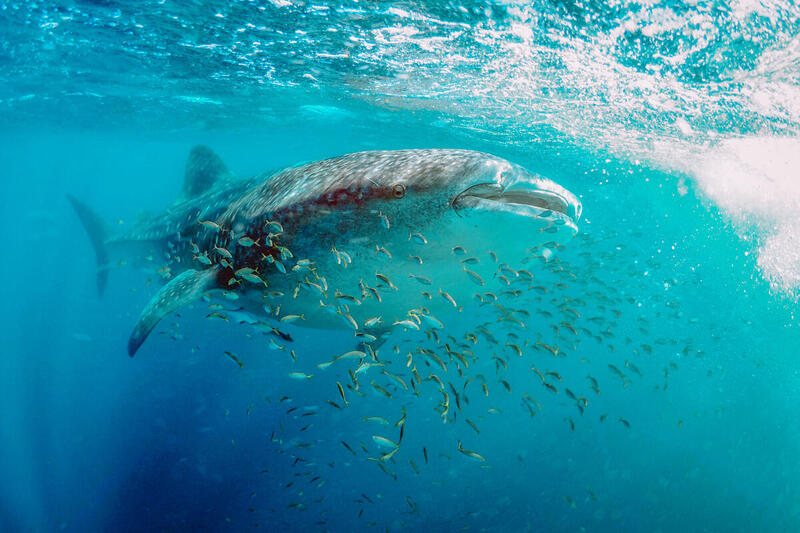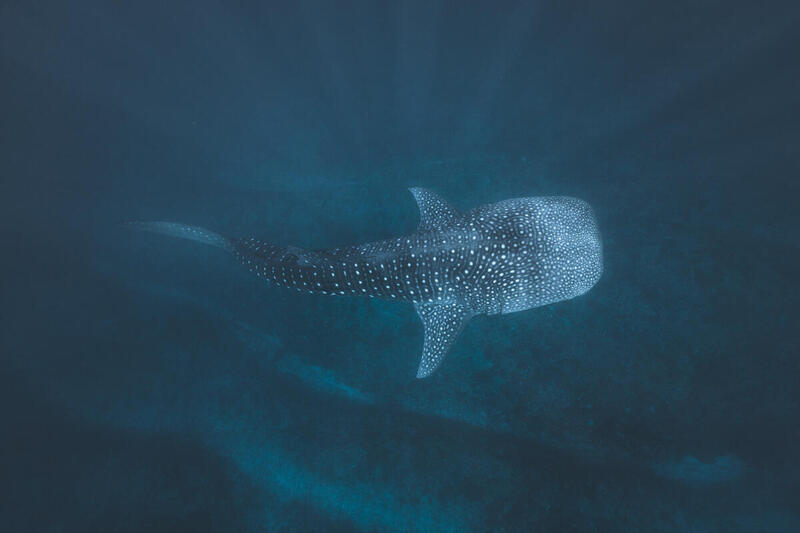The whale shark, the world’s biggest fish, is what draws people to UNESCO World Heritage-listed Ningaloo Marine Park. These gentle giants congregate at Ningaloo, nestled on the Western Australian coastline near Exmouth, between March and August each year, thrilling thousands of visitors and fuelling the area’s booming tourism industry.

But while whale sharks are the biggest drawcard, they’re far from the only extraordinary thing about Ningaloo. This place, where the arid desert meets the Indian Ocean, is a cradle for a wealth of marine life, from turtles to vast oceanic manta rays to lush underwater coral gardens.
Ningaloo also hosts one of the world’s most spectacular annual coral spawning events, clouding the reef with plumes of pink and red spawn. The spawn and the upswell of nutrients in the water are what draws the whale sharks here over winter.
It’s almost unbelievable that this special place is threatened by the oil and gas industry. Oil and gas drilling sites circle the Ningaloo area. Flaring is visible from the shore at Exmouth on a clear night, far out at sea. Gas company Woodside even recently proposed to dump a toxic oil tower from its Nganhurra oil field close to the reef system, full of toxic foam that could devastate marine life – and Greenpeace recently uncovered that this tower is now sinking.
A concerted campaign by locals put Ningaloo’s incredible natural beauty and environmental value on the map, and earned it a reprieve from exploitation. The economic value of Ningaloo contributes an estimated $110 million annually to the WA economy, more than 90% of which comes from reef tourism.
It’s Ningaloo’s economic value that has protected it so far. As writer Tim Winton, an Exmouth local, puts it in an ABC interview ahead of the release of his documentary on Ningaloo:
“…if you don’t tell people about a place and it stays secret, then — and anyone who’s in Western Australia in particular knows this — bad things happen in the dark. Bad things happen to places over the horizon. And if we hadn’t made Ningaloo famous 20 years ago, it would be gone already, so you have to elevate a place’s social value, it’s sadly sometimes its financial value, as an intact system in order to get the kind of status required to protect it.”
We’ve come here as the final stop on our biodiversity documentation leg of the Rainbow Warrior Whales Not Woodside ship tour. For the past few weeks we’ve been working with our onboard marine scientists Dr Olaf Meynecke and Franzi Saalmann to record the rich marine life and wild landscapes along the coast from Fremantle to Exmouth, to bring these extraordinary places to the public attention. It seems fitting to end this leg of our documentation trip here, in a place that has achieved a fragile safety – but still faces existential threats.
Spill mapping based on Woodside’s own data shows that a worst-case scenario spill from the gas company’s monstrous Burrup Hub would impact the Ningaloo Marine Park. An accident would release millions of litres of gas and condensate, a substance similar to crude oil, spreading hundreds of kilometres along the West Australian coast, hurting local communities and crucial industries such as the tourism economy that sustains Exmouth.
But while we’ve come to document the whale sharks, bureaucracy stands in our way. A mix-up means that we are unable to obtain the correct permit for filming whale sharks. A frantic last minute application leaves our science and documentation team cruising on a choppy and windswept sea, anxiously checking phones for the all-important permit.
And then, as we’re filming a graceful oceanic manta ray, a small miracle occurs. A whale shark unexpectedly swims serenely right through the middle of our group, close enough to touch. It’s untroubled by our presence, as we flail to capture it on film while it glides away into the deep.

It feels like a gift from Ningaloo, a reminder that the ocean is a place that defies expectations and plans. Nature doesn’t stick to the script.
Join the campaign to protect Ningaloo, and all the wild and beautiful places along the WA coast, from Woodside’s Burrup Hub.
Tell your MP that you want to protect these amazing places by getting us off fossil fuels and onto clean, renewable energy.
By Fiona Ivits

